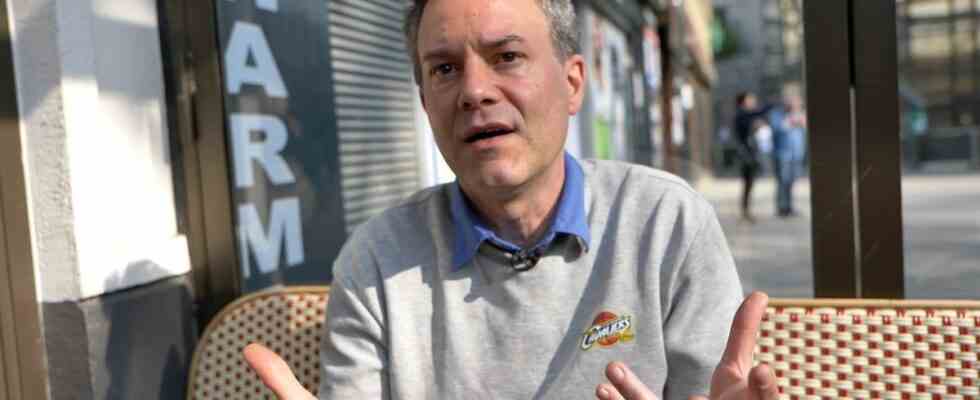“Our economic systems aggravate ecological shocks with one hand and weaken the institutions that could protect us from them with the other,” he insists. In his book Economic reason and its monsters, economist Eloi Laurent, a teacher at Sciences Po and a specialist in social ecology, deconstructs step by step the economic systems that govern us and their workings. Scratching, in passing, certain “subjective” constructions on which many candidates in the presidential election rely, such as debt, inflation or even growth.
Only a few days before the first round of the presidential election, he therefore agreed to decipher in front of the camera, for 20 minutes, certain proposals of the candidates. And to answer a few questions, as a prelude to this high-flying exercise.
Your book is divided into three parts: neoliberal mythologies, social-xenophobic mythologies and ecolo-skeptic mythologies. In fact, is it a bit of a counter program that you are proposing to candidates?
We are in a time of both weariness and confusion. Obviously, everyone is exhausted by the two years of emptiness that we have just passed. We have the feeling that the shocks follow one another, that we no longer control anything. So, I asked myself how I could be useful in this period. So I tried to show that, behind the political language, there was an economic grammar. And that, ultimately, the proposals and programs belonged to and obeyed this logic.
Because, behind the recomposition of the French political field into three blocs – a centre-right bloc, an extreme right bloc and an ecological social bloc – it was possible to identify three other large blocs which are of order, not of political language, but economic grammar: neoliberal grammar, social-xenophobic grammar and ecolo-skeptical grammar. And which cross all political fields. And what is obviously problematic is that this economic grammar is based on mythology. So the point of writing this book was to try to decipher an election which is, in fact, a non-election and which seems very far from the concerns of the French. Because, in reality, the major structuring questions today revolve around the environment, health and the future of the social model. It is around this that a political offer must be built! Not around the question of security, immigration and Islam.
Debt, growth and inflation are topics that come up regularly in the mouths of presidential candidates. Well Named ?
I was very struck to see that Jean-Luc Mélenchon, who presents an undeniably original and audacious program, felt obliged to carry out an exercise to quantify his program, subject to an obligation of growth. A program which, moreover, claims to reverse the table on a certain number of levels, and in particular on the question of the economic system. Personally, I think the GDP is a completely derisory and outdated indicator today. The story of Macron’s tenure, from a growth perspective, is a decrease, absolutely every year, in the GDP growth rate. And yet, employment and purchasing power are improving. This therefore means that employment and purchasing power are disconnected from growth. This also means that these two concerns, to which you can add the issue of health and the environment, which are absolutely central from an economic point of view, have almost nothing to do with the issue of growth!
So all these major macroeconomic indicators – unemployment, inflation, growth, debt, deficit – are on the way to becoming almost negligible in a world in which the major questions are, on the one hand, the ecological question, on the other, the health question. And if it were necessary to keep only two essential indicators, I would keep the temperature of the planet and the life expectancy.
You say that our economic systems aggravate ecological shocks. How?
We have a global energy mix which today is 80% made up of fossil fuels. Each additional unit of economic growth, in this context, aggravates climate change. Moreover, there is an almost perfect indexation between the gross domestic product (GDP), the rise in temperature and the concentration of greenhouse gases in the atmosphere. And therefore the damage that is associated with climate change. The first part of the sixth IPCC report published in August 2020, very clearly states the sustainable scenario for humanity in the 21st century consists of exiting growth and opting for other measures. Because if we continue like this, we will simply explode the biosphere, make it collapse under the weight of our systems.
The ecological crises really began in 1940-1950. However, it is precisely at this moment that man invents and establishes industrial growth. Either the fact of basing our economic systems on economic growth. The adoption of GDP as a reference indicator has done absolutely colossal damage. On the other hand, I think it is absolutely fundamental to continue to defend the welfare state, while criticizing economic growth. If we take the four highest candidates in the polls, three of them, in this case Emmanuel Macron, Valérie Pécresse and Eric Zemmour, want to attack the welfare state in France. However, it is the welfare state that has held the French economy together in the face of the Covid crisis, and it is the welfare state that really constitutes the cement of French society.

